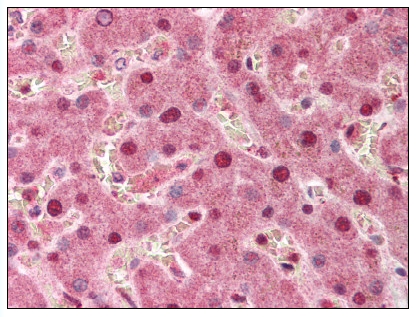iASPP (PPP1R13L) Rabbit Polyclonal Antibody
CAT#: AP07622PU-N
iASPP (PPP1R13L) rabbit polyclonal antibody, Aff - Purified
Need it in bulk or conjugated?
Get a free quote
CNY 6,116.00
货期*
5周
规格
Specifications
| Product Data | |
| Applications | ELISA, IF, IHC, WB |
| Recommend Dilution | ELISA: 1/40000 - 1/160000. Immunofluorescence. Immunohistochemistry on Paraffin Sections: 2.5 µg/ml. Western Blot: 1/1000 - 1/5000. |
| Reactivity | Human, Bovine, Canine, Mouse |
| Host | Rabbit |
| Clonality | Polyclonal |
| Immunogen | Synthetic peptide corresponding to Amino Acids 780-797 of human iASPP (isoform 1) protein. |
| Formulation | 0.02 M Potassium Phosphate, 0.15 M Sodium Chloride, pH 7.2 with 0.01% (w/v) Sodium Azide as preservative. State: Aff - Purified State: Liquid purified IgG fraction. |
| Concentration | lot specific |
| Purification | Immunoaffinity Chromatography. |
| Conjugation | Unconjugated |
| Storage Condition | Store the antibody undiluted (in aliquots) at -20°C. Dilute only prior to immediate use. Avoid repeated freezing and thawing. |
| Gene Name | protein phosphatase 1 regulatory subunit 13 like |
| Database Link | |
| Background | ASPP proteins (ASPP1, ASPP2 and iASPP) represent a new family of p53 binding proteins. ASPP1 and ASPP2 bind and enhance p53-mediated apoptosis. In contrast, the third member, iASPP, functionally inactivates p53. iASPP (also called protein phosphatase 1 regulatory (inhibitor) subunit 13 like protein, Inhibitor of ASPP protein, Protein iASPP, PPP1R13B-like protein and NFkB-interacting protein 1) plays a central role in regulation of apoptosis and transcription via its interaction with NF-kappa-B and p53/TP53 proteins. iASPP blocks transcription of HIV-1 virus by inhibiting the action of both NF-kappa-B and SP1. This protein also inhibits p53/TP53 function, possibly by preventing the association between p53/TP53 and ASPP1 or ASPP2, and therefore suppressing the subsequent activation of apoptosis. iASPP is predominantly a cytoplasmic protein (isoform 1) but can also be found in the nucleus (isoform 2). iASPP is highly expressed in heart, placenta and prostate and is weakly expressed in brain, liver, skeletal muscle, testis and peripheral blood leukocyte. The N-terminal region of isoform 1 is required for cytoplasmic localization. Defects in iASPP may be a cause of certain breast cancers and the protein is overexpressed in many patients suffering from breast carcinomas and expressing a wild-type p53/TP53 protein. |
| Synonyms | RelA-associated inhibitor, IASPP, NKIP1, PPP1R13BL, RAI |
| Reference Data | |
Documents
| Product Manuals |
| FAQs |
| SDS |
Resources
| 抗体相关资料 |
其它PPP1R13L产品
Customer
Reviews
Loading...


 United States
United States
 Germany
Germany
 Japan
Japan
 United Kingdom
United Kingdom
 China
China

